Through a partnership with Fordham’s London campus, GSS students can study abroad, learning about the differences between social work in the U.S. and the U.K. and visiting historic sites. This past summer, about 30 students participated in the two-week program, but two of them stayed behind for three more months to complete inaugural field internships abroad.
“I felt like this program was made for me,” said Melanie Hills, 24, a master’s student from Glastonbury, Connecticut, who interned at a London community center and served predominantly immigrant populations. “It’s a multi-service, multigenerational approach—and it’s exactly what social work, in my mind, stands for.”
A Moving Encounter with an Asylum Seeker
Hills worked at Coin Street, a community center that serves Waterloo and North Southwark residents, where she assessed the needs of local families and connected them with services. She recalled a pregnant woman who had experienced human trafficking in her native country and was seeking asylum in London with her two young daughters. Hills said she was able to connect the mother with a local school for her children, a children’s center that could teach her daughters how to communicate in English, and a midwife who could alleviate her stomach pain, despite some initial language barriers.
“We couldn’t understand each other because our translator phone wasn’t working, so we just stood there, trying to communicate with each other. Finally, I used Google Translate,” Hills said. “She gave me this big hug afterwards, and I was like, ‘OK, this is why [we]do this.”
As someone who isn’t native to the area, said Hills, it wasn’t easy to connect Londoners with certain services and understand what rights and entitlements they qualified for. But by the end of her internship, she described herself as “self-sufficient.”
“I had support from Fordham the whole way through and from Coin Street, but I really worked hard, and I’m proud of myself,” said Hills, who regularly checked in with GSS faculty, deans, and her supervisor while abroad.
This spring, Hills will graduate with her master’s degree in social work, and plans to work in hospital administration.
“Being in London taught me how competent and powerful I can be,” she said.
‘Helping People to Be Their Best Selves’
Master’s student Vaughn Rush interned at Oxford House, one of the first settlement houses in the United Kingdom that has evolved into a modern-day community center. Rush said he helped to facilitate multiple events, including a Somali culture festival and a “Black history bike ride.”
“It felt [like]social work in a community-based sense because … they embedded the community in getting things that the community needed and working with them to help themselves,” he said.
Rush, a 36 year old from Jamaica, Queens, has worn many hats. He is a veteran who served as a behavioral health specialist and medic in the U.S. Army for seven years and a male drag queen, among other things. After graduating this spring with his master’s degree in social work, he plans to earn his master’s degree in applied theater. He wants to combine his social work and theater skills “to make some mental health magic” in a non-traditional way, ideally for the U.S. Army or the Department of Veterans Affairs, he said.
What he will take from his London internship experience is his growth in empathy, he said.
“Listening to the differences in people’s lives and their values … showed the differences between us, but also the things we have in common,” Rush said, “and that helps with us being one big world … and helping people to be their best selves.”
Watch the video below and learn more about the GSS program abroad.
]]>
“Now we are enabling students to come to campus and have the same opportunity to complete the program within a quick time frame as an online student would have,” said Melba Remice, assistant dean for admissions at GSS. “This is for students who really want the ability to complete the program quickly, while gaining experience, skill sets, and knowledge in an in-person setting.”
What Are Advanced Standing Students?
Advanced-standing Master of Social Work (M.S.W.) students already have a bachelor’s degree in social work and are now pursuing graduate school. What separates them from traditional students in the same program is the amount of coursework they are required to complete. In Fordham’s Master of Social Work program, full-time traditional students usually take up to two years to complete their graduate degree. But advanced-standing students who have already completed coursework and fieldwork in social work as undergraduates can apply their experience to their graduate programs and complete their master’s degree in less than a year. They save time—and money, said Remice.
Saving Time and Money, While Studying in Person
For years, Fordham allowed its full-time advanced-standing students to begin coursework only during the fall semester, not in spring, due to the nature of their coursework and fieldwork. (Only part-time advanced-standing students could begin school during the spring semester.) Starting in spring 2024, those students will be able to start their master’s program in the spring semester in either an online setting or in person, completing their degrees by the end of August.
“The advanced-standing program provides graduate students more flexibility, a quicker timeline, and on-campus networking opportunities to advance their careers,” Remice said.
The application deadline for Spring 2024 is Dec. 1. Learn more about the on-campus M.S.W. program.
]]>Students and faculty in Fordham’s Graduate School of Social Service are supporting women asylum seekers, one of the most vulnerable populations in New York City, by working with them to increase access to health care and mental health services and advocate for the protection of migrants’ rights.
On Nov. 10, they convened with activists who work in academia, city government, the law—and women asylum seekers themselves—to talk about future work and solutions.
‘The Solutions Will Come From People’s Voices’
Over the past year and a half, more than 130,600 migrants arrived in New York City from countries like Venezuela and Senegal, seeking asylum from violence, persecution, and other traumas in their homelands. The city provides temporary shelter and helps migrants to apply for legal status, work authorization, and permanent housing, but it’s not easy to address every single need. In fact, the city just announced that it is limiting shelter stays for migrant families with children to 60 days in its housing system.
“The city is doing the best that they can. But the solutions to what’s happening right now are not going to be coming from the city,” said Anne Williams-Isom, FCLC ’86, New York City deputy mayor for health and human services, at the symposium, which was held at Fordham’s Lincoln Center campus. “The solutions will come from people’s voices who have experienced this and who are sharing their stories with us, and hoping that academia and government and others will listen.”
Her Migrant Hub
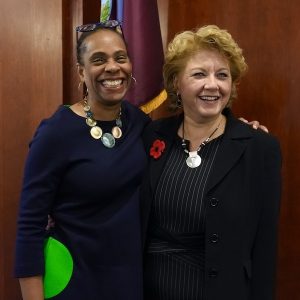
Those in academia are listening. Through Her Migrant Hub, a website created by Fordham faculty, students, and women asylum seekers, migrants in New York City are able to better understand their rights in the U.S. and easily access services with a direct impact on women’s well-being, such as health care, housing, and mental health. Perhaps most uniquely, they are taught how to tell their own stories and to advocate for themselves and their loved ones.
Her Migrant Hub has greatly expanded since its inception in 2021. The community-driven program, which primarily receives funding from the Mother Cabrini Health Foundation and is supported by additional funding from organizations like World Education Services Mariam Assefa Fund, is revamping its web platform based on suggestions from women migrants, students, scholars, and service providers. The website was updated this November with several new additions, including direct mental health support via phone, text, or video on the platform itself.
In addition, Her Migrant Hub now has an advisory board that includes eight women asylum seekers who have become activists. Six of them are from the initial core Her Migrant Hub group; one is a representative for newly arrived women asylum seekers, and another is a representative of the community of indigenous Garifuna women asylum seekers. The board also includes two service providers who are able to listen to the women and develop solutions based on their feedback. They now meet in a dedicated space at the Lincoln Center campus that the activists and GSS students will decorate to reflect the different cultures and shared stories of the community.
The Her Migrant Hub team, led by GSS professors Marciana Popescu, Ph.D., and Dana Alonzo, Ph.D., is also planning a series of trainings on trauma-informed care, migration-related trauma, and vicarious trauma for service providers who work with this population in New York City. Women asylum seekers will also receive training on how to educate migrant communities, employers, and service providers about forced migration and the challenges faced by their community.
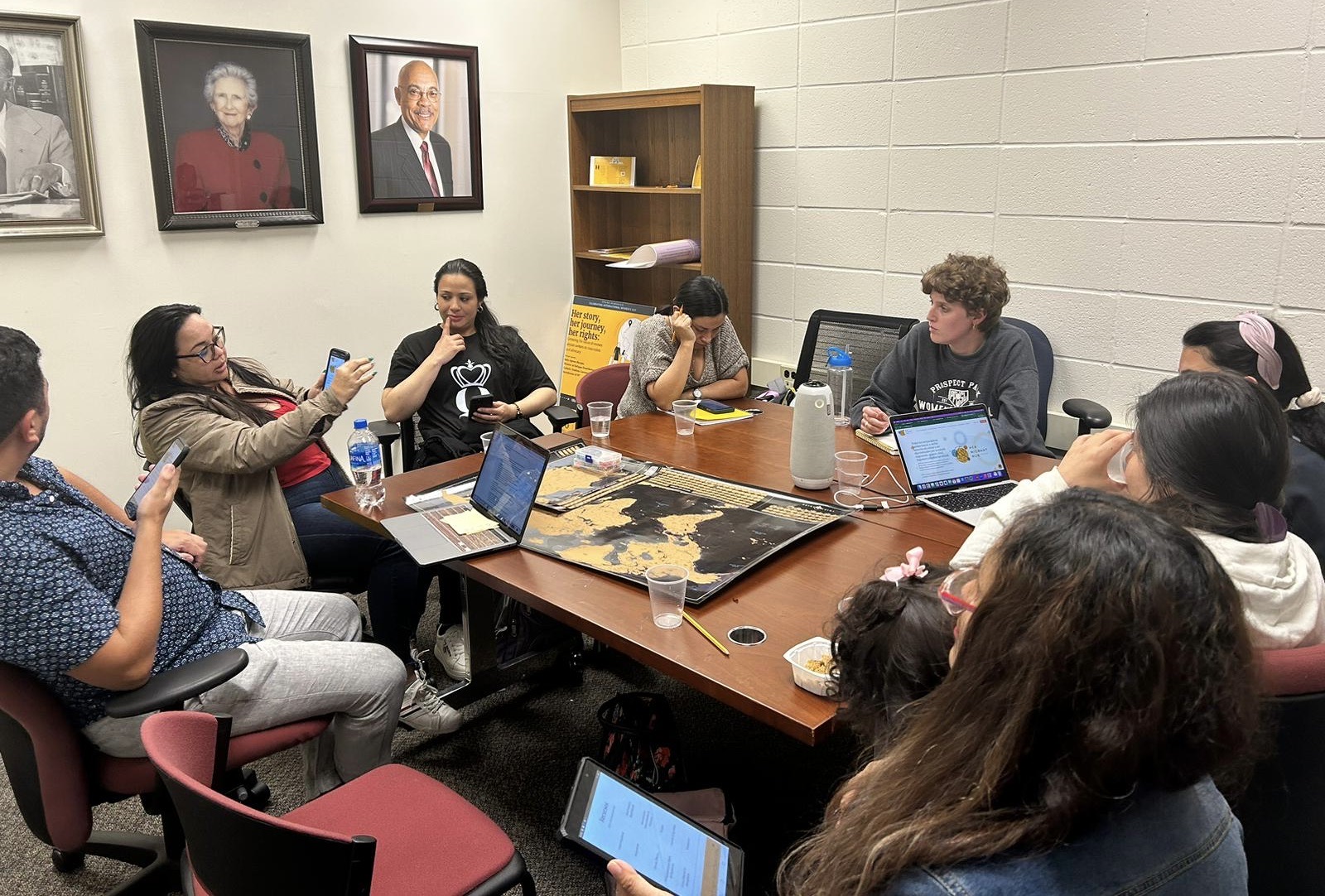
Students Engaging with Migrants in Crisis
GSS students are engaged in all of these efforts. Two sit on the advisory board alongside the asylum seekers. Eight are interning at organizations such as the New York City Mayor’s Office’s new Asylum Application Support Center and Emma’s Torch. Others are participating in Forced Migration and Social Work Policy and Practice, a new course co-developed by GSS professors and Her Migrant Hub’s women activists. This course is part of a project funded by New York Community Trust, which aims to develop best practices for social workers who work with migrant populations and engage students in specialized internships.
Most recently, in October, clinical social work students under the supervision of Alonzo began providing one-on-one mental health support to migrants through the Her Migrant Hub website.
Among the students involved in this collective work is Luisa Fernanda Sandoval Cortes, a Ph.D. student who serves as a case manager coordinator for a program for asylum seekers at Catholic Charities of New York. For Her Migrant Hub, she is a project coordinator, facilitating a mental health group for new women asylum seekers. She shared some key takeaways from her experiences at the Nov. 10 symposium.
“Social workers and professionals should be trained in assisting asylum seekers from an intersectionality perspective to be able to understand gender, race, language, and cultural differences among this population,” said Cortes, who also emphasized the importance of providing fast and extended work permits to migrants. “And I would add empathy.”
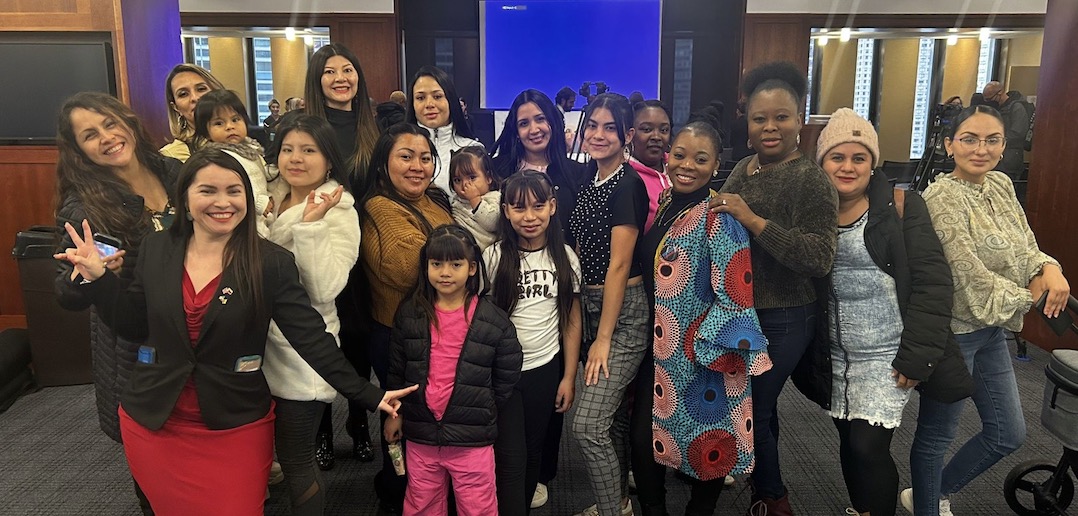
Read more about the symposium.
]]>First in Their Families
Lori-Ann Andrews was inspired to pursue a dual degree in early childhood and early childhood special education at the Graduate School of Education, where she wanted to “utilize the downtime” that came with the COVID-19 pandemic.
Andrews, who is in her seventh year teaching, saw a need to provide support to students receiving special education services.
“I’m getting chills right now,” she said. “Every day, I see children across the board where they need services pertaining to special ed, but they’re not getting those services, because the general ed teachers don’t have the knowledge as to what to look for. As a special ed teacher, I will be able to make sure that those students receive all the services that they need.”
Andrews was surrounded by her family, many of whom traveled to see her graduate.
“I’m really so proud of her, I actually flew in from Florida to be able to support her,” her sister Cavell Lilly said. “She really is amazing.”
Andrews said that earning a master’s degree with her family’s support felt very significant
“I’m the first [in my family]to receive a master’s degree, so it’s breaking that generational curse.”
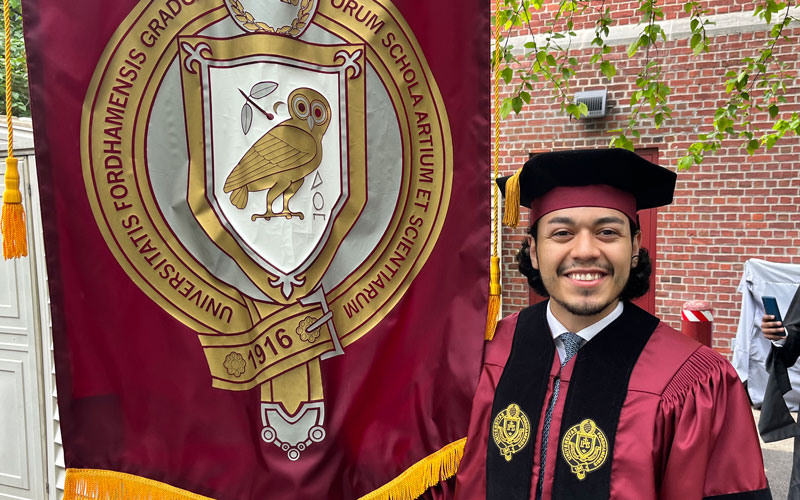
Mardoqueo Arteaga, who earned a Ph.D. in economics from the Graduate School of Arts and Sciences and served as the president of the Graduate Student Government, said a speech six years ago by Joseph M. McShane, S.J., then president of Fordham, inspired him to enroll in the doctoral program.
“I was a DACA recipient,” said Arteaga, referring to the federal Deferred Action for Childhood Arrivals program, which allows young people brought to the U.S. as children to remain in the country. “In 2017, Father McShane sent out a message that was pretty convincing about this place being a place where I felt safe to come—and inclusive. I knew I wanted to get a Ph.D., and I thought this would be a good place to kind of be intellectually free, while also knowing that the community was rather supportive of someone like me.”
Arteaga, who goes by Marc, will be starting work as an economist with KPMG. He views earning a Ph.D. as both a privilege and responsibility.
“It’s a privilege to do so because I know that my family, and where I come from—you don’t have those kinds of opportunities,” he said. “But more than anything, I also consider it a responsibility, because I’m changing a narrative that would otherwise remain unchanged.”
New York City: The Finance and Fintech Capital
Shafrin Mustafa said that the reputation of the Gabelli School of Business’ MBA program and its location drew her in.
“I know that they had a really great reputation and it was located in New York, and this is where I wanted to be,” said Mustafa, who is graduating with an MBA with a double concentration in finance and fintech.
Mustafa, who is from Canada, said her time in the program flew by, as she’ll be starting work with American Express in July.
“It’s been a very exciting journey. It almost feels like it just started yesterday so I can’t believe we’re here already.”
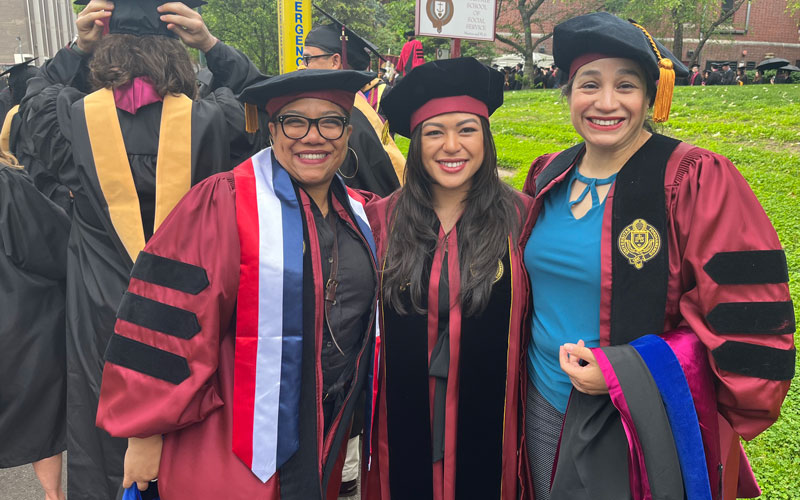
Research for Single Mothers and Education
Three students graduating with their doctoral degrees from the Graduate School of Social Work, Carolyn Peguero Spencer, Danielle Jimenez, and Denise Gosselin, said that they leaned on the community they developed at Fordham.
“You really have to have a beautiful cohort to get through. You’re not going to get through this alone,” said Spencer, a licensed clinical social worker, who got her master’s at the Graduate School of Social Work in 2000. She decided to return for the doctoral program to finish some “unfinished work.”
“I just saw a lot of things and we didn’t have data for it and research for it, so I was told, ‘You do it. You research it.’”
And so she did, putting together her thesis on single mothers in the Latina community, titled Intersecting Identities, Education, and Economic and Subjective Well-Being: A Qualitative Testimonio Study Among Latina Single Mother Community College Students.
Additional reporting by Patrick Verel
]]>Carolyn Donovan, GSS ’16, works at P.S. 86 in the Bronx, where she provides both individual and small-group counseling and is part of the school’s crisis team. At Fordham’s Graduate School of Social Service, she specialized in trauma and did her field placement at a foster care placement office while also working at the Good Shepherd Services’ family foster care program in the Bronx.
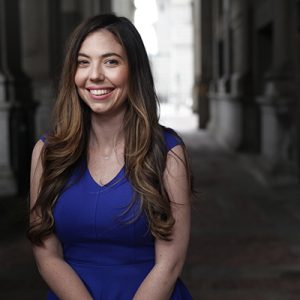
Every day at P.S. 86 is different, as Donovan helps connect families to the resources they need, whether they’re struggling with housing, food, or an immigration matter.
“Social work is a unique field,” she said. “It’s multidimensional and you get to make a difference and advocate for the well-being of the people you’re working with.”
Preparing ‘Agents of Change’ to Meet a Growing Need
Demand for social workers in the New York City area and across the country is skyrocketing, fueled by the mental health crisis during the pandemic as well as the aging of the Baby Boom generation. The U.S. Bureau of Labor Statistics projects that employment for social workers will grow faster than the average for all occupations, increasing by 9% by 2031 with about 74,900 openings predicted for each year.
Debra M. McPhee, Ph.D., dean of the Graduate School of Social Service, said the work of professional social workers is critical during these complex times.
“In this era of great change and global racial reconciliation, the need for knowledgeable, skilled, and compassionate professional social workers is as great as it has ever been. Social workers bring a unique perspective to society’s most challenging problems, serving as agents of change whether they are working with individuals, families, organizations, or communities,” McPhee said.Steeped in the Jesuit tradition of cura personalis—care for the whole person—Fordham runs the largest school of social work in New York state, graduating 1,000 students each year who go on to work in a range of settings, including public agencies, nonprofits, hospitals, and schools. Because of Fordham’s long, rich history in social work, students benefit from a supportive alumni network and from courses taught by faculty members with deep expertise in the field.
A Connection with NYC Schools
Roger Ball, GSS ’02, is a GSS adjunct faculty member and supervisor of school social workers for the New York City Department of Education. He said that Donovan’s holistic approach at P.S. 86 is a hallmark of Fordham graduates. A social worker from Fordham will take the initiative to seek partnerships with community-based organizations, he said, and find resources for the families at their schools.
“They aren’t just going in to provide clinical intervention,” Ball said. “GSS students at Fordham are learning about human rights, social justice, environmental justice, and economic justice, and they’re going in with that lens.”
Ball noted that GSS also works with NYC DOE schools on professional development for social workers, guidance counselors, assistant principals, and principals.
“That part gives the opportunity to go deep and build capacity,” Ball said. “These are resources that a lot of schools can’t afford. It allows kids to get the social-emotional and learning support and allows our emerging clinicians to get a rich body of experience.”
During the COVID-19 pandemic, the NYC DOE hired more than 400 social workers—“the largest amount at any point that I can remember in public education,” Ball said—and the schools still need more.
Leadership in Caregiving
Ellen Travers, GSS ’22, never planned to become a social worker. A former media planner and a mother of four, Travers’ path took a turn when two separate health crises rocked her family.
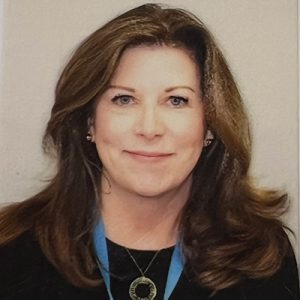
First, she served as the primary caregiver for her elderly father until he passed in 2006. That experience led her to volunteer at the Ken Hamilton Caregivers Center at Northern Westchester Hospital, which provides resources and support to caregivers. Then her husband, Paul, received a devastating diagnosis of metastatic renal cancer. She cared for him until he died in 2018.
Having navigated the complex medical, legal, financial, and emotional terrain of being a caregiver twice, Travers realized that social work was her true calling. In 2019, she enrolled in the Graduate School of Social Service. After finishing the MSW program and passing the licensing exam last year, she returned to the Ken Hamilton Caregivers Center—this time as the program manager.
“I needed to do something with all this caregiving in my life,” Travers said. “Getting a master’s degree in social work tied together my life circumstances with meaningful work. If you’ve been on the caregiving side, you understand the need. It’s impactful, it’s very simple, and it’s the right thing to do.”
Focusing on hospital social work, Travers was particularly interested in evidence-based interventions for the geriatric population. “I received an incredible education because of some exceptional professors who are professionals in the social work field,” she said. “I was fortunate to have access to the Henry C. Ravazzin Center on Aging and Intergenerational Studies and have Professor Janna Heyman as a mentor.”
A Flexible Program with a Variety of Specializations
A GSS education is designed to be flexible, both in terms of scheduling and curriculum, said Melba Remice, the assistant dean of admissions. Students can enroll full-time or part-time, taking evening and weekend classes at either the Lincoln Center or the Westchester campuses. GSS also offers hybrid and online options.
Students have the freedom to tailor their studies to their area of interest. In the first half of the program, all students receive the same foundational courses. In the second phase, they pursue their own course of study, which can include trauma, palliative care, and global policy through a unique collaboration with the United Nations. Most students are required to participate in two field placements.
Scholarships and Fellowships
One challenge to increasing the pipeline of social workers is the cost of a master’s degree. Almost half of new social workers are the first generation in their families to graduate from college, and affording graduate school can be difficult.
Fordham offers a number of scholarships and fellowships to help MSW students, including the Palliative Care Fellowship and the PIPELINE for Youth Health Fellowship program.
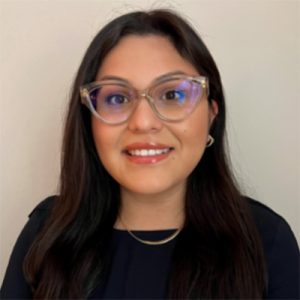
For Jessica Castillo, earning her MSW has been made possible by the Centennial Scholarship Award from Fordham GSS and Catholic Charities, which was established in 2018 and provides full tuition.
A first-generation Mexican-American who was once a mentee at Bigs & Littles, she returned to the organization to work as their receptionist after completing her undergraduate degree at St. John’s University in 2016. The Bigs & Littles staff encouraged her to go into social work and apply to Fordham.
Castillo now works full-time as the communications and development officer at Bigs & Littles NYC Mentoring and takes classes in the evening. She can already connect what she’s learning in her classes with the interactions she observes between social workers and clients at work.
“Bigs & Littles helped me so much and I want to give back,” Castillo said. “I had been thinking about going into social work, but I didn’t have the funds. Getting this scholarship felt like winning the lottery.”
‘The Force for Hope and Light’
For Donovan, Fordham’s ingrained commitment to social justice and the education she received prepared her for the realities and challenges of social work.
“In the field, you are going to come up against things where you need to be the force for hope and light,” she said. “Because I had a strong foundation from my classes and my professors, I was able to translate that into actual practice.”
FORDHAM GRADUATE SCHOOL OF SOCIAL SERVICE ADMISSION INFORMATION
Apply: Visit GSS for more information on prerequisites and the application process.
Information Sessions: Register for an information session or email [email protected] to schedule an appointment.
Upcoming Open Houses: Fordham GSS will hold open houses for its Westchester (4/15) and Lincoln Center (4/17) campuses. Learn more and register here.
—Mariko Beck
]]>
The symposium, titled “Leading for Change: How to Create Sustainable Impact in Children and Family Services,” brought together agency leaders, government officials, service providers, and more to learn about how partnerships can improve care and how the system can work to confront challenges.
Anne Williams-Isom, FCLC ’86, New York City deputy mayor for health and human services, helped organize the symposium to provide a place for professionals to learn with and from each other. While Williams-Isom was unable to attend, she said that the idea for the forum came from the legacy of James Dumpson, the late activist and leading social crusader who served as the city’s first black welfare commissioner and as GSS dean from 1967 to 1974.
“So much of Dr. Dumpson’s work was about the intersection of policy, practice, and research—he wanted to ensure that NYC children, families, individuals, and communities were supported with dignity,” said Williams-Isom, who served in leadership positions in the city’s child welfare system for many years before going on to lead the Harlem Children’s Zone, an education and anti-poverty nonprofit.
John Mattingly, a former head of New York City Administration for Children’s Services (ACS), encouraged those in attendance to value the importance of public service.
“Public service creates public value,” he told those in attendance. “The work that we highlight tonight is one example of public service going back into the mid 1990s. And still going on here in New York City as we speak.”

A Look Back
Mattingly, who served as the welcome speaker, set the stage for the first panel, which featured a look back at the history of ACS. The panel included Linda Gibbs, who served as deputy mayor for health and human services for New York City; Gerard McCaffery, the former president and CEO of MercyFirst, a nonprofit human and social service agency; Sister Paulette LoMonaco, formerly of Good Shepherd Services; and Fred Wulcyzn, the director of the Center for State Child Welfare Data, Chapin Hall, at the University of Chicago.
Shirley Gatenio Gabel, the Mary Ann Quaranta Endowed Chair at GSS, who served as the moderator, highlighted the strides that many of the panelists had made during their time working with or for the city.
“There’s one statistic that keeps on coming to mind—in 1996, when ACS was founded, there were 50,000 children in care, and today, there’s 6,800,” she said. “So I think we can all agree that’s 6,800 too many children in care, but what an accomplishment. And a lot of that accomplishment is due to the hard work of people on this panel and people in this room, and many others working together to create a new system for children.”
The Importance of Data
Wulcyzn said he’s seen how data and story collection from those in the system can help to make improvements. He has about 4.5 million records of children in foster care since the late 1970s, when they first started tracking children’s experiences—at the time on index cards, compared to today’s more modern, efficient system.
“In the last 45 years or so, we have completely changed [the system], and our ability to know something that was happening to children is extraordinary,” he said. “And at the time with Linda and Nick [Scoppetta, the first head of ACS] and all the people who worked at ACS at that time, it was the first time we really had a chance to demonstrate what could be done to take those stories seriously and use them to make a better system.”
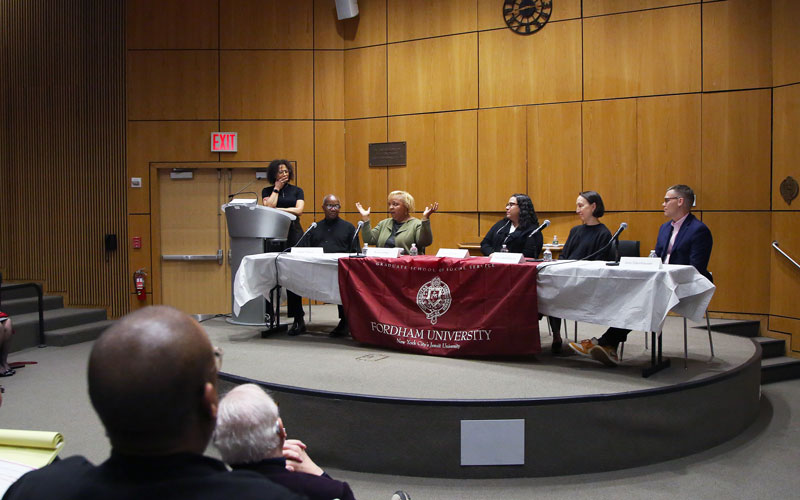
Addressing Current Issues
While panelists acknowledged that progress had been made in serving children and families, the second panel of the evening highlighted some of the challenges that still need to be addressed. The panel featured Jess Dannhauser, the current ACS commissioner; Julia Jean-Francois, the co-executive director at the Center for Family Life; Benita Miller, the executive director of Powerful Families, Powerful Communities; Raysa Rodriquez, chief program and policy officer at Federation of Protestant Welfare Agencies; and Willie Tolliver, professor at the Silberman School of Social Work at Hunter College.
Jennifer Jones Austin, LAW ’93, the CEO of the Federation of Protestant Welfare Agencies, an anti-poverty, policy, and advocacy organization, served as the moderator. She said that as she listened to the speakers from the first panel, she kept thinking of the word sankofa, which is an African word from a tribe in Ghana.
“The literal translation of the word sankofa is ‘it is not taboo to fetch what is at risk of being left behind,’” she said. “What it means is taking from the past what is good and bringing it into the present to make progress in the future.”
Jones Austin said that she saw this as the goal of the evening—to look back on the history of ACS and to engage in “constructively critical analysis” of child welfare.
Miller said one of the things the agencies should keep in mind as they continue this work is the need to keep the community and the voices of children at the center of it..
“For me, it was very, very important to bring in folks who were impacted by the system to the conversations that were happening around their lives,” she said.
Inequities and Underlying Causes
Jones Austin emphasized that the system is set up to “treat the symptom.”
“To solve the problem, we have to get at the underlying cause that created the problem in the first place,” she said, citing examples of structural inequities such as poverty, mass incarceration, economic deprivation, social and emotional well-being, and a lack of clinical resources in communities. “We’re not going to solve these problems by just pouring more money into systems that are in place, at best, to treat the system.”
Dannhauser also highlighted the disparities that he and his team are working to address.
“There’s disproportionality throughout the entire system—the most disparate point is at the point of the call,” he said. “It’s 6.6 times more likely that a Black family be called [into ACS]than a white family in New York City. That means, according to one study, that we are investigating almost half of Black families in New York City—44%. And that’s something we’re working really hard on to fix.”
One way is through providing families with resources upfront, he said.
“We have a lot of work to do around how we engage families. We are very open in this administration that it may not be right for ACS to be building all of the solutions, but that there should be other areas that are created, and we have a long way to go.”
Williams-Isom said the goal of the forum was to focus on “how to create sustained reforms over many years in children and family services.”
“The panelists demonstrated the power of diverse teams to bring about systemic change and large-scale reform,” she said in an email following the event. “This needs to happen throughout the entire human services system so that we can reimagine what is possible so that people can truly thrive. I am so proud that Fordham GSS is at the center of this very important work.”
]]>Mayor-elect Eric Adams announced Williams-Isom’s appointment during a press conference on Monday, Dec. 20, where he introduced four other women who will serve as deputy mayor in his administration.
“You are just seeing the coming together of an amazing team,” Adams said. “This is going to be my core leadership, and they are going to ensure that we move our city in the right direction.”
In her role as deputy mayor, Williams-Isom, a 1986 graduate of Fordham College at Lincoln Center, will oversee the city’s health and social services agencies, including the New York City Health and Hospitals Corporation, the Department of Social Services, and the Administration for Children’s Services. She’ll work to address the needs of seniors, children, victims of domestic and gender-based violence, and people struggling with hunger and homelessness. One of her main areas of work will be to continue to guide the city’s COVID-19 response and address some of the issues exacerbated by it, including a growing need for mental health services.
“We’ve all been hit hard by this pandemic, and we are all feeling it. But I know that this administration will help us get through. We will heal, and we will heal together,” Williams-Isom said after the announcement.
Williams-Isom will be sworn in on Jan. 1, along with Adams and the rest of his administration.
She was raised in Queens by a single mom, a Trinidadian immigrant and a nurse who always stressed the value of a good education. After completing her bachelor’s degree in psychology and political science at Fordham College at Lincoln Center in 1986, Williams-Isom went on to earn a J.D. from Columbia Law School. She also received an honorary doctorate from Fordham in 2018.
Lifting Up Those in Poverty
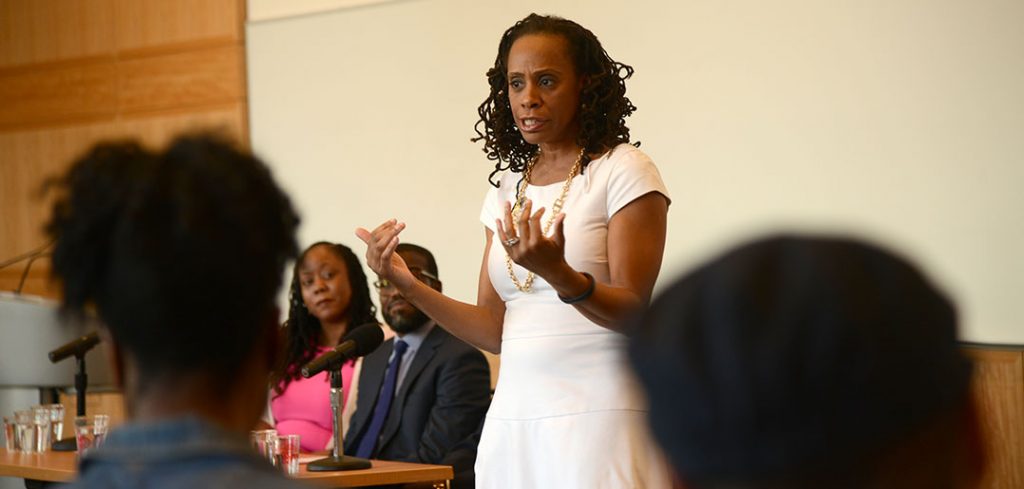
(photo by Tom Stoelker)
Williams-Isom is no stranger to working with people in need, particularly children and families in poverty. Prior to returning to Fordham as the Dumpson Chair, Williams-Isom spent more than 10 years at Harlem Children’s Zone (HCZ), a nonprofit anti-poverty organization, first as its chief operating officer and then as its CEO. The organization was praised by former President Barack Obama as a “model anti-poverty program for the nation.”
More than 25,000 children and parents in Central Harlem participate in the organization’s “cradle to college pipeline” programs that aim to break the cycle of generational poverty through workshops for new parents, academic help in HCZ-run charter schools, and college prep services.
“It’s not just me running a school well or an after-school program well. I’ve got to run 24 different programs really, really well. Mediocrity can’t be,” Williams-Isom told Fordham Magazine in 2014 after her appointment as CEO. “It comes down to this sense of urgency: How many generations are we going to let fail?”
Williams-Isom continued those efforts in her most recent role as the James R. Dumpson Chair at Fordham, where she worked with faculty and students to develop research, programs, and policy analyses that improve services to at-risk children and families.
The position was named after James Dumpson, a former dean of Fordham’s Graduate School of Social Service who, like Williams-Isom, worked on bettering the lives of children. He was a social worker, professor, and administrator who began his career as a children’s caseworker and rose to become New York City’s first Black welfare commissioner in 1959.
“For me to be able to come back [to Fordham] and really think about service and what it means to serve the most vulnerable is an honor. Put that together with Professor Dumpson’s vision—and as an African American woman—I think he would be super proud to see me in this position,” she said.
When she took the role in 2020, Williams-Isom said that for years she had been working to help provide a “holistic approach to our children and families,” and that she appreciated Fordham’s commitment to cura personalis, or care for the whole person.
“I think attending to somebody’s spirit is very important, especially with the trauma that we have seen, based on the policies under which disenfranchised folks have had to live in this country,” she said.
Working for the City
When Williams-Isom is sworn in on New Year’s Day, it won’t mark her first experience in New York City government. She spent 13 years, from 1996 to 2009, in the city’s Administration for Children’s Services, first as the director of the Office of Community Planning and Development, then as special counsel to the commissioner and as associate commissioner for external affairs, and finally as the deputy commissioner for community and government affairs. Before working for the city, Williams-Isom worked for five years as a lawyer after graduating from Columbia Law School.
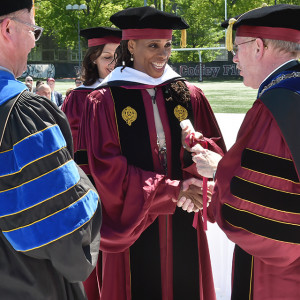
In 2016, she was appointed by New York City Mayor Bill de Blasio to his Children’s Cabinet Advisory Board.
Earlier this month, in her role as the Dumpson Chair, Williams-Isom convened a group of more than 175 parents, community activists, lawyers, academics, nonprofit leaders, and government employees for the first of four meetings to discuss ways to reform the child welfare system, which has been disrupted by the COVID-19 pandemic. The discussion, titled “Narrowing the Front Door to NYC’s Child Welfare System,” will resume in January.
At the initial meeting, Williams-Isom said she has spent years thinking about ways to fix the child welfare system, dating back to her first stint with the city in the 1990s, and she noted that it disproportionally affects families of limited means and those who are Black and Latinx.
“There are people who say you have to blow up the whole system, because it’s terrible and based on racist principles, and we can’t fix it,” she said. “Then there are people who are reformers like me. I call myself ‘abolition curious.’ I’m kind of beginning to see it’s not as easy to change systems and take out the years and years of racism in them.”
In her new role, Williams-Isom will be tasked not only with reforming the child welfare system but also overseeing critical health and social service agencies dealing with inequities that have been exacerbated during the pandemic. After she was inaugurated as the Dumpson Chair, she said now is the time to take a look at these services anew.
“We have agency and we have choices,” she said, adding that the necessary changes will take what journalist Isabel Wilkerson has called “radical empathy.”
“Radical empathy is not about you and what you think about a situation that you have never been in and probably never will be in,” she said. “It is a kindred connection from a place of deep knowing that opens your spirit to the pain of another as they perceive it.”
]]>“I exemplify a PCS student: mature, older with lived experience, someone who came to Fordham to add to their education toward starting a new career,” said Burke, a graduate from both the School of Professional and Continuing Studies and the Graduate School of Social Service, in her graduation speech. “Fordham was able to help each of us see our experience, even our adverse experiences, from a universal perspective, helping us turn all those experiences into viable skills and insights we can use to help others.”
Burke was born into a large family on Long Island. Her father was a decorated World War II veteran and a salesman who worked his way up in the garment industry until he owned his own textile mill. At age 46, he suddenly passed away from a heart attack, leaving behind his wife and their 10 children, including 6-year-old Burke. Over the years, the family has dealt with significant trauma, including alcoholism and suicide. Burke herself is in recovery.
Burke dropped out of high school and followed in her father’s footsteps in the garment industry. She started working as a receptionist for a dress company and became a sales manager who worked with companies like Victoria’s Secret. But after more than three decades, she realized that the American textile industry was falling apart. Many U.S. businesses had moved their operations overseas, where other countries produced goods more cheaply, and the American mills couldn’t compete. Burke said she was also discouraged after working in a male-dominated field without equal pay for so long.
“I just got so disillusioned,” Burke said, reflecting on her life over a phone call. “I was like, why am I doing this? I’m putting lace on a panty, and how is that helping the world?”
At age 50, she decided to go to college. Burke was on track to become the second of her siblings to earn a college degree. Many of her brothers and sisters had dropped out of high school and found meaningful careers that didn’t require higher education. Agatha became an accomplished chef who worked for David Bouley; Bill was a war photographer who died while documenting 9/11; Christopher is a retired boat builder whose work took him around the world. But their children took a different path.
“Oddly enough, every one of our children went to college. I guess we all realized after the fact how important the college experience really is,” said Burke, now married with one son.
Burke earned her GED at age 50. The following spring, she was delighted when she received her acceptance letter from Fordham. But a month after she received the good news, she learned that one of her sisters was diagnosed with stage four lung cancer.
“She was living with me, and I was there every step of the way. I was holding her hand when she died. To be able to be present like that for someone is amazing,” Burke said. “It changed my whole life. Social work was what happened, and it was beautiful.”
In the fall of 2015, Burke became a student at Fordham. She hadn’t been in a classroom since 1978 and often felt scared and overwhelmed, especially when she received a zero on a test during her first semester.
“People my age who are going back and trying again can get discouraged very easily,” said Burke, who was 52 when she returned to school. “But every step of the way, there was somebody there to help. It made a world of difference.”
In 2020, Burke earned a bachelor’s degree in social work from the School of Professional and Continuing Studies. The following year, she earned a master’s degree in social work from the Graduate School of Social Service.
This fall, Burke was promoted to clinical social worker at the Mental Health Association of Westchester, where she had served as a recovery specialist for three years. She now works with clients who are struggling with their mental health.
“I’m not fixing or changing anyone. I’m helping people figure out what they need to do for themselves to help them find their way,” said Burke, who, as a recovering alcoholic, is able to empathize with many of her clients.
When Burke was selected as the student speaker for her graduation ceremony this past September, she chose to look back on her time at Fordham. She said she was stunned by one of her first courses, an introduction to social work through a trauma lens—a remarkable reflection of her life.
“I was so taken aback by it: the culmination of my life in print, right before my eyes,” said Burke in her speech. “I was able to process grief and eventually heal, as it validated many of my feelings. It was cathartic and empowering, all at the same time.”
Now, at 59, she says she’s ready to continue helping others find themselves.
“My perspective in the past five years has changed dramatically,” Burke said. “And everything that I’ve learned at Fordham has come into play.”
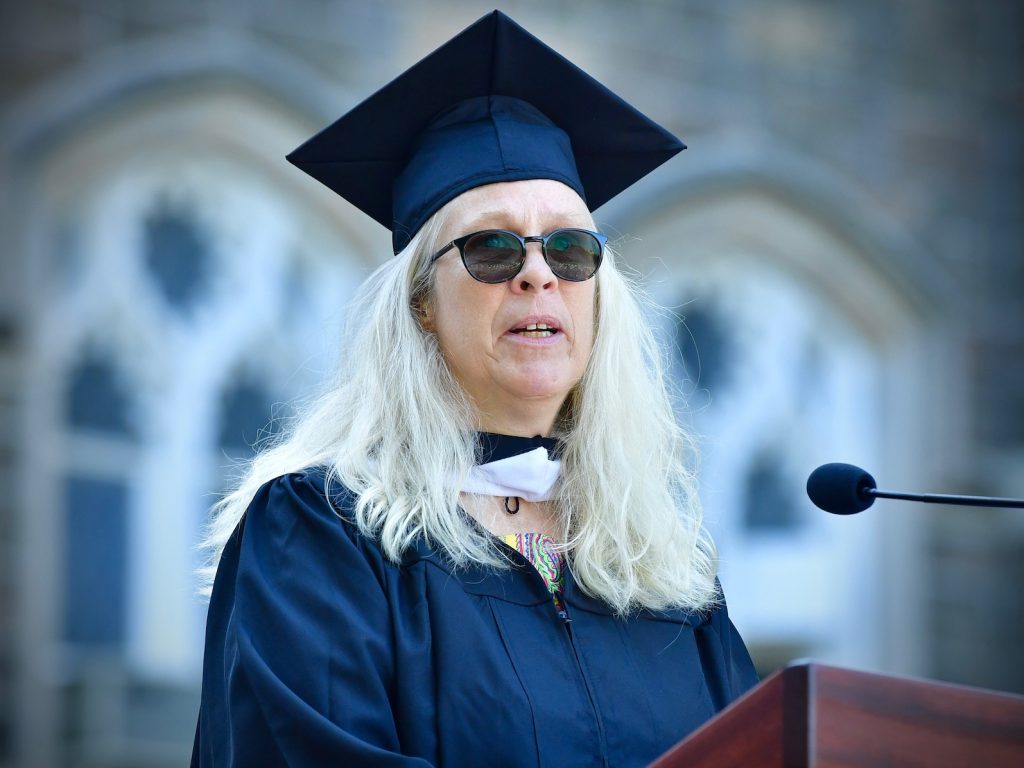
Pandemic Exacerbated Health Challenges in Communities of Color
“While we are not yet on the other side of COVID-19, we know that this pandemic—which is likely the largest public health crisis we will see in our lifetimes—has been nothing short of a collective trauma,” said Ross, who spearheaded the grant effort and is the principal investigator. “It has disproportionately affected communities of color and has placed New York City’s youngest residents at risk of a host of adverse health and behavioral health outcomes. To mitigate these challenges, there is a dire need for a well-prepared behavioral health social work workforce equipped with skills in prevention, interprofessional practice, and health equity that mirrors the population most affected.”
Addressing Need for Social Workers from Diverse Backgrounds
The project, which is part of HRSA’s Behavioral Health Workforce Education and Training Program for Professionals, sets out to address workforce shortages in social work and lack of diversity in the profession while equipping workers with skills designed to address the potential impact of adverse childhood experiences, said Debra McPhee, Ph.D., dean of the Graduate School of Social Work.
“The overarching goal of PIPELINE for Youth Health is to create a sustainable pipeline of racially and ethnically diverse behavioral health practitioners equipped with the skills needed to work effectively with youth,” said McPhee.
Each year, a total of 27 student fellows—26 MSW students and one doctoral candidate—will be supported with stipends to offset the cost of tuition while they participate in a specialized training program that prioritizes prevention, integrated care, and health equity for underserved young people. The project has been funded for five years; 75% of the student fellowship slots are reserved for students of color.
The PIPELINE for Youth Health team is led by Ross and includes Binta Alleyne-Green, Ph.D., associate professor, Larry Farmer, Ph.D., associate professor, Janna Heyman, Ph.D., professor and Henry C. Ravazzin Chair; Christie Hunnicut, director of field education; Liz Matthews, Ph.D., assistant professor; Yvette Sealy, Ph.D., associate professor; Linda White-Ryan, Ph.D., associate dean of students; and Anne Williams-Isom, D.Min., professor and Dumpson Chair in Child Welfare.
Ross said the new training program will prioritize prevention, integrated care and interprofessional practice, and health equity in the youth behavioral health workforce. The program begins this fall, when students will participate in required coursework; a PIPELINE Integrative Seminar; and a special speaker series featuring innovations in prevention-oriented practice with children, youth, and their families.
“We were already facing a major shortage of youth behavioral health practitioners here in New York City even before COVID-19 emerged. The need is now greater than ever,” said Ross. “I am very excited to work with the PIPELINE for Youth Health team to develop and implement a specialized behavioral health training program that will greatly enhance the social work workforce dedicated to serving the children, youth, and families of New York City.”
]]>
“The idea is to support women who are seeking asylum and to make their transition and waiting period more bearable and sustainable,” said Marciana L. Popescu, Ph.D., website co-founder and associate professor in the Graduate School of School Service. “We want the ability to preserve confidentiality and anonymity for online visitors. This is extremely important because we’re dealing with a population that lives in fear.”
More than 79 million people are displaced worldwide, according to a 2020 report from the United Nations High Commission for Refugees, and more than half are women. Tens of thousands are in New York City alone. Few attempt to seek health care services in fear of deportation, and the pandemic has worsened the situation, especially for women asylum seekers, said Popescu.
Her Migrant Hub was built thanks to a $150,000 grant from the Mother Cabrini Health Foundation. In addition to accessing resources on the site, asylum seekers can share best practices and meet women who have experienced similar struggles. The project began in January; the website was launched in late June in honor of World Refugee Day.
“It’s designed by the women, down to the colors that are used on the website, the images, the graphics, the logo, the website name itself—everything was done collaboratively and driven by the women who are part of this group,” said Dana Alonzo, Ph.D., website co-founder and GSS professor who specializes in mental health.
Showing the Experts What’s Missing
The website was developed by a team of about 20 people, including a Fordham graduate student and an alumnus. Because Her Migrant Hub was developed in conjunction with the target audience—the women asylum seekers themselves—it is unlike many resources developed by experts and scholars, said Popescu and Alonzo.
“They are teaching us what it means to be an asylum seeker, to live in NYC and not be able to get the services you need,” said Alonzo. “They are looking at the website and saying, ‘This is what we’re missing.’”
Among them is Marthe Kiemde, 36, who fled political persecution in Burkina Faso with her husband while pregnant in 2016. She said that during their first four years in the U.S., they raised their newborn in New York City shelters, where they also received career training and got back on their feet.
“I know many immigrant women who are struggling right now. They don’t know where to go to get any services, especially in health care. They are afraid to go because they don’t have any papers … But this website is secure,” said Kiemde, who helped research immigration and childcare policies for Her Migrant Hub and now works as a hospital dietary associate. “With this program, we’re going to help many, many women.”
Another website collaborator is Vanessa Rosales-Linares, 40, an asylum seeker from Venezuela. She said she was an anesthesiologist who fled her native country in 2017 with her husband and 8-year-old daughter after giving medical treatment to government protesters and fearing punishment from political leaders. Rosales-Linares said she now wants to help people who were once in her position.
“[The website has] good information because it’s from many people who have in the past had the same problems. They are telling their histories and teaching how to improve their situation for new immigrants,” said Rosales-Linares, a website designer for Her Migrant Hub and a nursing student at Lehman College.
‘A Window Into What Is Happening’
In addition to providing local health care resources, Her Migrant Hub simplifies the asylum seeking process and an asylum seeker’s rights in New York City through text and graphics. It also provides an online forum where women asylum seekers and allies can share their experiences and read stories that help them feel less alone, said Popescu and Alonzo.
This fall, the website will launch several new features, including expanded translation services; a workshop webinar series designed and co-taught by women asylum seekers; and Her Migrant World, an educational page that takes a deeper look at global migration and the people at the center of it all.
“We hope that Her Migrant World will be a window into what is happening and why people take so many risks to come here and the reality on the ground,” Popescu said.
‘This Feels Like Home’
After project funding ends in December, Popescu said she is confident that her team will continue to make a difference in the lives of women asylum seekers across the city. Within their team, they have also found a home.
“We talk all the time. All our joys and sorrows started to be shared in the group, so the group provides support,” said Popescu, adding that they chat via WhatsApp. “At our second meeting or so when we first met, one of the women said, ‘This feels like home.’”
]]>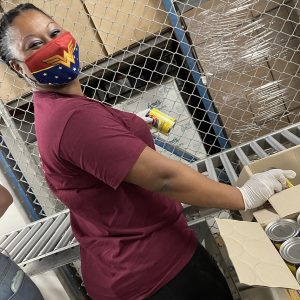
“After leaving the military I wanted to work more with people so I had to decide: What am I good at? I didn’t want to just work to work, I wanted to be fulfilled, and social work met all of what I needed,” she said. “I wanted to make an impact. Also, I like the autonomy of social work, it’s me and my clients.”
Born and raised in Brooklyn, Wright joined the Air Force in 1999 and retired as a master sergeant. In the Air Force she served in a variety of roles, from working in dining, lodging, and deployment facilities to computer records management to communications and signal intelligence at Fort Gordon, Georgia—site of the U.S. Army’s Cyber Command. While in intelligence, she still longed to work directly with people.
After she earned her bachelor’s in social science online in 2017, Wright decided to concentrate on substance abuse when she began her social work studies. Like all GSS students, her first field assignment was chosen for her. She worked at a college in the office of student disabilities, which allowed her to use many of her military organizational skills while arranging services to meet students’ needs. Her second placement was when the “real social work” began, she said. She interned at the opioid treatment program at the Addiction Institute of Mount Sinai. She noted that there’s a personal reason she loves working with that population.
“My parents both passed away early due to HIV as a result of drug use. I always thought that would be my way to help, because sometimes, in this world, real life gets hard,” she said. “I don’t need to be someone who is trying to change anybody. I just want to be there to support them and let them know that not everybody views them negatively.”
Once again, Wright drew from her military experience in her new role. She said that in the military you can’t take things personally.
“Therapy is to heal the client, it’s not to boost me up. People do whatever they need to do, whatever’s best for them, right? You should not want to change them, because that takes that responsibility and puts it on you. That’s a lot of responsibility,” she said. “And people are going to make mistakes, whether it’s relapsing or hurting others, that’s just life.”
Her mentor, Danielle Esposito, is a lecturer at GSS with 13 years of experience working with children and families. Esposito said that Wright’s life experience will protect her from the burnout many new social workers experience.
“It usually takes a while to understand you can’t change a person and that usually happens after your first really tough case,” said Esposito. “You are not there to fix or change, but to support and be a sounding board for whatever a client chooses, especially in recovery.”
Esposito said that Wright was a natural leader in her classes, particularly when it came to a role-playing aspect of the course. She said that Wright was “willing to go anywhere” with a role, either as a client or a therapist, which made the rest of her classmates feel comfortable and safe.
“She would take on the role of the therapist and try out the techniques just taught in the class,” said Esposito. “She’s open to feedback and boy does she follow through with it.”
Wright seems to have absorbed the GSS training that stresses that social workers must take care of themselves before helping others. She volunteers with RamVets, she runs marathons, and she belongs to a MeetUp group that explores parts of the city that she never saw growing up.
“Did you know there’s a lighthouse on Roosevelt Island? I never knew that,” she said, noting that it was also her first time on the tram.
Her first priority will be to land a full-time position where she can help addicts know that they are not alone and that they can count on her not to judge them on their road to recovery.
]]>